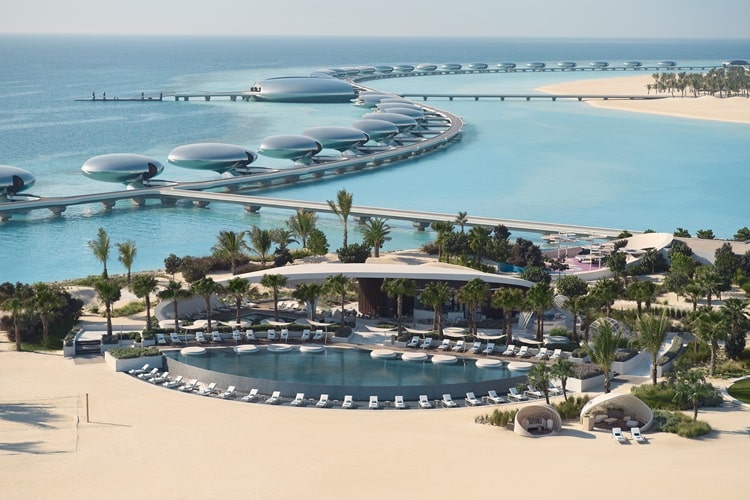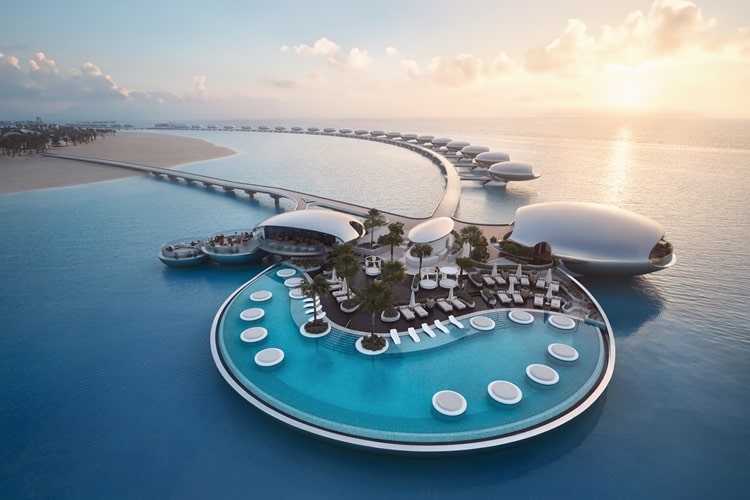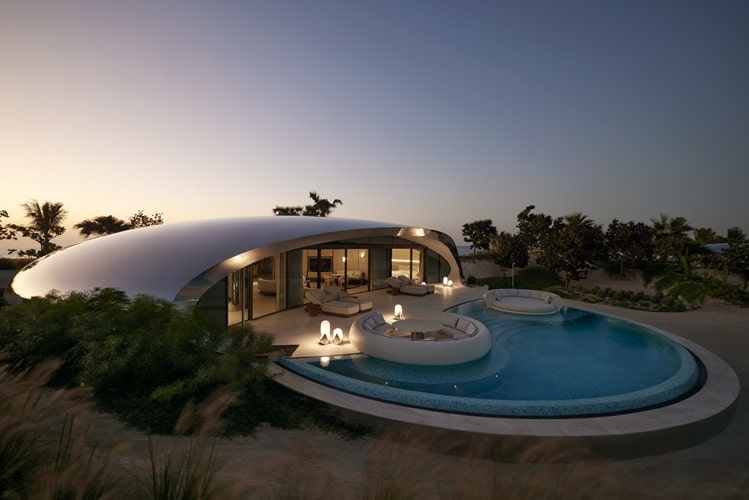Riyadh, Saudi Arabia- – Rising above the turquoise waters of the Red Sea, the silvery orbs of Shebara, the newest ultra-luxury resort to open in Saudi Arabia’s The Red Sea destination, look as if they have come from the future. But the inspiration for their extraordinary architecture comes from nature and from the pristine waters of Saudi Arabia’s Red Sea.
Each of these shimmering, stainless steel orbs houses one of the new resort’s 73 villas. The overwater villas form a chain that seems to float on the sea like a string of pearls. The beach villas sit on top of pale sands, reflecting their surroundings and almost becoming one with the horizon. It’s a staggering first impression of accommodations unlike anything the world of hospitality has seen before, and one that Carla Puverel, Shebara’s General Manager, is excited for her guests to experience. “The design of Shebara is so ambitious and futuristic, yet so connected with the nature that surrounds us here,” she says. “It all blends together to create a truly unique and iconic resort that reflects The Red Sea’s ambition to become an extraordinary regenerative destination for the world.”
Ambitious architecture and responsible design
Shebara’s architecture by Killa Design, the studio behind Dubai’s Museum of the Future, embraces not only a futuristic vision of hospitality design, but a new vision of what a resort can look like, featuring engineering technology that has never before been used in a hospitality setting. “Shebara demonstrates how innovative architecture can gracefully flow into nature, with orbs that reflect and refract light from the sky and sea to blend naturally with their environment,” says Shaun Killa, design director and founder of the studio.
The sparkling pods take their inspiration from the sea. “They’re almost like bubbles that come up from the ocean floor, reflecting everything that’s above them,” says Killa. “When you look at Shebara, it reveals itself from the water.”
Stand in front of one of the orbs and they seem to disappear into the horizon, shimmering almost like a mirage. The bottom of the villas reflects sea or sand and the roof reflects the sky, constantly changing from sunrise to sunset, becoming part of the environment that surrounds them. Overwater villas are Suspended above the waves, and a mere stone’s throw from colorful coral gardens that surround the resort. Set back over 50 meters from the natural coral reef, the villas’ supporting columns touch only a few square meters of ground, a light touch approach that aligns with the enduring commitment to protect the thriving habitats of the lagoon. “The result is an aerial accommodation pod that almost seems to defy gravity, and suspends the guest directly above and within the beauty of this marine eco-system,” says Killa. “Each overwater villa is like an observation platform for guests to witness the fish, birds and turtles that thrive in this area.”
Off-the-grid and powered by the sun
Shebara, located on Sheybarah Island, is surrounded by The Red Sea’s pristine nature, with clear waters, dense mangroves, sand dunes, and healthy coral reefs. Located 25 kilometres offshore from the mainland, the resort has been designed to tread lightly on the natural environment, in line with the goals of The Red Sea to become a world-leading regenerative destination that takes sustainability seriously. “All villas are constructed, fitted out and commissioned offshore, and shipped to the site as a ‘plug-in’ to the solar-powered zero energy infrastructure,” says Killa. “The offshore construction methodology was implemented to preserve the natural environment of the island, minimizing any potential impact to coral and wildlife”.
Shebara’s solar panel park, which supplies all electrical energy and powers desalination, cooling, lighting and transportation, is also part of the guest experience. The park is designed to be not only aesthetically pleasing, with a circular layout reflecting that of the rest of the resort’s architecture, but also invites guests to pass through it on biking and walking paths, showcasing the authenticity of the resort’s efforts to operate in a sustainable, regenerative way, celebrating them rather than hiding them. “The entire infrastructural backbone of the project forms part of a visitor experience where guests can be exposed to and learn about the approach that goes into making the project a truly self-sustained development,” says Killa.
Interior design on a human scale
Inside the villas, interiors by Studio Paolo Ferrari focus on creating harmony through a concept Ferrari describes as Natural Futurism. “The connection between the architecture and interior was extremely important for us,” says Paolo Ferrari, the studio’s founder. “There is an incredible expectation that is set architecturally.”
For Ferrari and team, the aim was to create a guest experience that looks to the future combined with a human, cocooning aspect that strikes a balance between futurism and timelessness. Ferrari uses the analogy of a sea urchin to describe how he perceives the outside and inside of the villas fitting together. “In many ways, sea urchins express opposite qualities. For us, the architecture of Shebara is a protective shell that reflects sky and ocean, in essence dissolving its form,” he says. “We leaned into aerodynamics and movement to create soft and tailored interiors. With such unconventional architecture, the interior and furnishings needed to express a quality of invention.”
Artisanal details and materials that complement the surrounding nature
“There’s so much color outside with all the different shades of blue, and that allowed us to pull in a quality of restraint in the interiors,” says Ferrari. “Our idea is to frame the water, and to let nature be the real focus.”
The interiors of Shebara are reminiscent of super yachts, with materials like leather, wood and hand-crafted detailing throughout. Given the physicality of the villas with all of their curved surfaces, Ferrari and team needed to design the interiors in 3D.
“We needed to use sophisticated software and programs that can lean into softness of form and can understand clearance and headroom,” says Ferrari. “How we maximize space in a villa like this is similar to how you design a private jet or yacht where you have to maximize every square inch.” The villa’s sleeping and living zones feel private yet connected, and interior details focus on artisanship, anchoring the interiors in a humanist quality while the exteriors focus on futurism and high engineering.
Ferrari hopes that Shebara gives guests a sense of excitement that is also inspiring. “My hope is that this is a future-looking resort that’s also comfortable, a place that feels new but at the same time inexplicably familiar,” he says. “We were really able to dream with this project and to imagine what, in 40 years from now, a guest room should feel like.”






